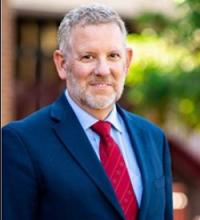Dispatch from the Director: Reflecting on 25 Years of Executive Development
TSC Institute Turns 25
As we celebrate this Institute’s 25th anniversary it is natural to reflect on where we came from and where we are headed.
This Institute was founded with a specific purpose in mind: to build an academic institute that reflected the needs of a fledgling industry. Specifically, the Intermodal Industry.
There were many people involved in the founding of this institute. Please indulge the recognition of some of those important people and pardon the negligence of not naming all that were, or have been, involved in the growth and maturation of the Institute, for there are many.
In the mid-1990’s Gil Carmichael, a former FRA administrator, and Joe Szyliowicz, a DU Professor, began discussing the issues facing the transportation ecosphere of the world and North America in particular. With support from Chancellor Dan Richie, and Provost William Zaranka, Professor Szyliowicz took up the challenge and assembled the initial faculty team, several of whom are still involved with the Institute. Gil recruited a top-notch group of Transportation leaders to be the first board and thus the “Intermodal Transportation Institute” was born. In the early years, the initial administrators of the program managed through significant trial and error and adjustment, and by 2002 the team, aided by Cathy Johnson, Donna Wilson, and a whole cadre of fresh faculty had established the first “Cohort” style format. This was an innovation whereby a group of students enter the program together and move through the program as a single team, taking the same courses at the same pace. We use this format to this day.
At the time of the founding of this institute, the term ‘intermodal’ meant, broadly speaking, connecting multiple modes of transportation to create an efficient, sustainable, and safe system that meets the needs of the marketplace. In the freight transportation business, this meant the containerization of global and domestic trade. The industries that served the concepts of containerized systems lacked specific leadership development opportunities. This was a major concern to these founders as they collectively stared down at an industry that was growing exponentially.
Since its inception in 1997, we have consistently evolved the Institute. We’ve added courses, modified others, and added content that matched the needs of the students and as advised by our board and alumni. It would be safe to say that the continuous improvement dynamic established in those early days remains a core contributor to our success.
Today, the Institute, now called the Transportation & Supply Chain Institute, has our traditional Executive Master's degree, a Supply Chain Master’s program, a Bachelor's Completion program, and multiple certificate programs. We maintain a highly active Advisory Board, a world class faculty, and a dynamic alumni community, all of whom contribute to the success of the Institute. We are well positioned to continue our mission of developing leaders for this industry.
Tens of thousands of people receive their MBA in North America every quarter. In its second full year, the online master's degree in Supply Chain Management, which is offered in partnership with Daniels College of Business, has grown to 80 students. The Executive Master's of Science in Transportation Management graduates around 20 students per year. A modest number by any measure. Sometimes, the smaller your niche, the better your expertise. Indeed, though our total Alumni community is moderate by modern academic comparison, it is the case that our graduates have indeed gone on to occupy some of the most important executive leadership roles in our industry.
This has been our history and our continued mission; to provide for leadership development in the Transportation and Supply Chain space. It is clear the original vision of the founders has been achieved, and the Institute's contribution to worldwide logistics is assured at a time in history when the stakes could not be higher.
